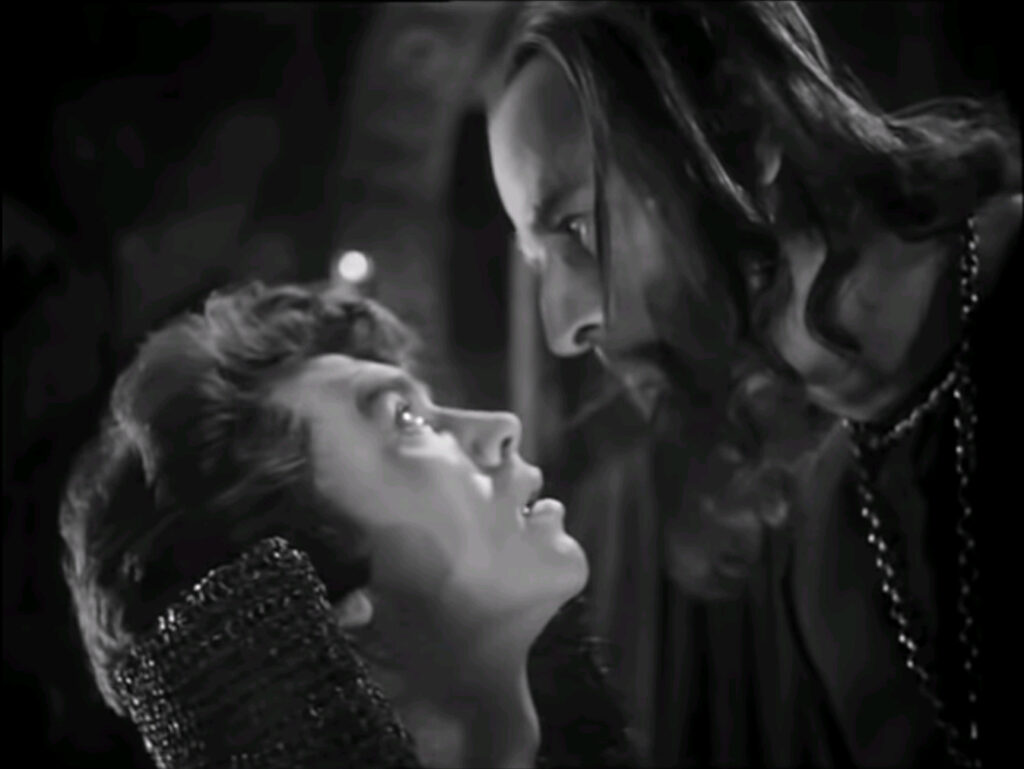
Still from Ivan the Terrible, director Sergei Eisenstein, credit Wikidata
Ivan the Terrible
Rimsky-Korsakov’s Ivan the Terrible, Grange Park Opera, reviewed by David Truslove
An opera impresario needs enterprise and tireless zeal and Wasfi Kani of Grange Park Opera has both. This season she has made the bold decision to include two unknown works: a world premiere by Anthony Bolton (whose career began as an investment banker) and a neglected opera by Nikolai Rimsky-Korsakov. Ivan the Terrible (originally The Maid of Pskov) has not been heard in Britain for over a century. But, as the first of his fifteen operas, written while he was still a serving officer in the Russian navy and sharing an apartment with Mussorgsky, Ivan the Terrible is a remarkably assured work, a portrait of flawed humanity, oppression and doomed love. Premiered in St Petersburg in January 1873, it was performed in Paris and London in 1909 when Serge Diaghilev introduced the renowned Russian bass Feodor Chaliapin. However, since then this richly scored work, with its ceaseless flow of lyrical invention, stirring choruses and touching romance, has become a musical footnote.
Based on a play by Lev Aleksandrovich Mei, at its heart, according to director David Pountney, it is a ‘story of the all-powerful ruler rediscovering his long-lost illegitimate daughter’. After crushing the inhabitants of Novgorod, the Tsar comes to Pskov to subdue its rebels. Prince Tokmakov wishes to appease and welcome the Tsar, while the rebellious Tucha, loved by Olga, has other plans. We learn through Boyarin Vera Sheloga, the overlong ‘prequel’ written some twenty-five years after Ivan, that Tokmakov is Olga’s uncle. Ivan, of course, is her real father and his startled recognition of her in Act II tips the scales in favour of Pskov, now spared from brutal suppression. Olga’s subsequent abduction and accidental death constitute the work’s tragic denouement and an opportunity to show Ivan’s humanity, a figure who appears in the opera’s second half as a brooding Joseph Stalin, complete with moustache and military uniform. It’s a neat trick which indicates history repeating itself as well as the perennial conflict between political expediency and personal emotions.
Pountney opts for a late medieval staging featuring Francis O’Connor’s austere wooden structure, with period costumes consisting of belted tunics, flowing dresses and headscarves. The portable set, atmospherically lit by Malcolm Rippeth, and replete with bells, icons and an onion-shaped chandelier, cleverly evokes sixteenth century Russia. The twenty odd Festival Chorus members sing with panache and sound twice their size. There’s a real emotional engagement here, and from a cast who create some memorable performances. Chief amongst these is Clive Bayley who consistently holds the ear and eye as Ivan in a vivid portrayal underlining tyranny and tenderness. This latter quality is especially affecting in Ivan’s Act III encounter with Olga, sung by an untiring and steely Evelina Dobračeva who doubles as her own mother Vera in the prologue. Her childhood reminiscences generate some of the evening’s most beguiling singing. There is much to enjoy, too, from Vlasyevna (Olga’s nurse) sung by Liubov Sokolova whose subterranean range makes a lasting impression. American tenor Carl Tanner, as Tucha, has a strong vocal presence, if somewhat wooden in delivery, but his ardour in the Act I love duet is unmistakable. Adrian Thompson is an obsequious then villainous Nikita Matuta, bringing his rapier-like tenor to bear in a well-defined characterisation. A more sonorous David Shipley is a sympathetic Prince Tokmakov.
At the helm of the hardworking Gascoigne Orchestra, reincarnated from Garsington Opera, is the energetic Mikhail Tatarnikov, who illuminates the work’s resourceful scoring and expansive lyricism with an honest conviction. Wasfi Kani and David Pountney have done Ivan the Terrible proud.
Sung in Russian with surtitles in English, Grange Park Opera’s production is at the Theatre in the Woods, West Horsley, until 14th July










